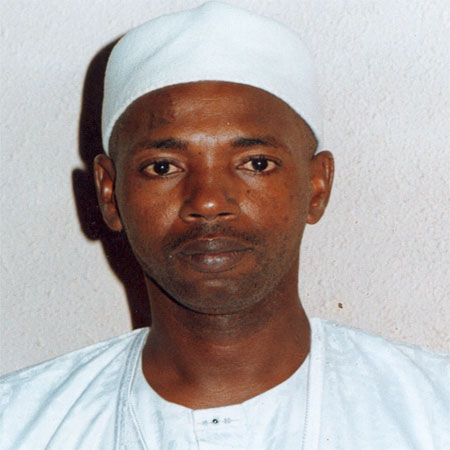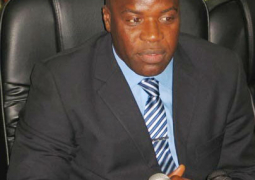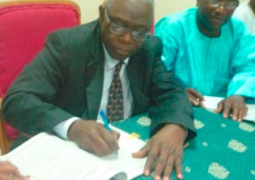
Hamat N.K. Bah, the leader of the opposition National Reconciliation Party (NRP) has said that his party still remains a separate political party, the way things were before it went into an alliance with the United Democratic Party (UDP).
"But let me tell you one thing, the NRP is on its own as it was before we went into alliance with the United Democratic Party. We are campaigning across this country, we will go everywhere possible, but we will share the same agenda with the UDP," Hamat Bah declared.
He was speaking at the second UDP party congress held at Jarra Soma in Lower River Region last weekend, which was attended by over 500 delegates and UDP party officials.
Hamat Bah attended the congress in response to an invitation from the UDP, and was the only national opposition party leader in attendance. Bah was accompanied by senior NRP party officials.
Addressing the congress, Mr. Bah assured the delegates that the NRP remains independent, but will cooperate with the UDP when and where necessary, and with any other opposition party that they deem to be genuine.
The NRP party, he added, has no time to entertain neither accept discussions with political parties, which he said, are only after "party headlines in newspapers."
"But, which do not even venture out of Banjul to know what is happening in the country, but only sit and make noise and create confusion in the minds of the people."
He said, "these are the parties who have derailed the democratic process in the country," and then affirmed that his party will never be a part of those elements.
"I want to make it very clear that we respect the UDP; we have learnt a lot from the UDP, and we appreciate all your support. And we can also assure you of our support when needed, and where it is necessary."
"But, I want to reiterate one thing. NRP remains NRP under the leadership of Hamat Bah, and we will continue to campaign to achieve our objectives in The Gambia," he announced.
Explaining his relationship with the UDP leader, Ousainou Darboe, the NRP leader asked people to cast their minds back to 2004, when thought was made to create an opposition alliance to bring about a change of leadership in The Gambia.
This was the call of delegates sent to the
According to Hamat Bah, the UDP and NRP went into this alliance with sincerity, and with great love for this country, and in the quest for democracy and change of leadership in The Gambia.
"Unfortunately, we did not realise at the time that we were dealing with people who could derail the objectives that we have all set ourselves."
"We discovered late that NADD was running into trouble, because people did not believe in the principles that NRP believed. That is, that in any alliance that you are going into, the bigger party should take the lead. This is the case anywhere in the world."
"You cannot lead a party that has less than 3% of the national vote, or you lead a party that has never been tested since it was registered in any elections, or you lead a party that has never contested elections. And then you want to lead an alliance with a party that has almost 42% of the national vote," he pointed out.
Consequently, said Hamat Bah, his party insisted that Darboe and the UDP should take the lead, and that they will not accept anybody's candidature apart from Darboe. As a result, he stated, they left NADD to form a UDP-NRP alliance, and that the results of the election have proven them right.
Hamat Bah described Ousainou Darboe as a man with leadership qualities, who can make every Gambian proud, adding that there relationship is one which is "very fruitful and reasonable."
Darboe's Address at the Congress
In his address to party delegates at the congress, Lawyer Ousainou Darboe, the Secretary-General and UDP leader, said any election contested on a level playing field will leave all contestants happy and feeling that each of them has been given a fair chance to contest.
"The level of the playing field is not measured by only the opportunities afforded to each contestant in presenting his programme and policies to the electorate."
"There is another factor, which is important, and that factor is institutional. The institution that has the responsibility and the mandate to conduct free and fair elections is the Independent Electoral Commission."
"We have witnessed how in the past, the Executive tampered with the independence of this institution by removing its members, including persons who have served as Chairman, without due process."
"The membership of the commission are selected and appointed by the President. This leaves the commission members at his mercy. A commission whose membership is drawn from civil society organisations, and who cannot be removed from office without the sanction of the civil society organisations to which they belong, will better ensure its independence," he said.
Ousainou Darboe added: "The equitable procedure for appointment of members of the commission will be to afford opportunity to all stakeholders to nominate their candidate to membership of the commission, and once appointed their removal from office should be in strict conformity with the Constitution."
"This will ensure that members of the commission will take decisions and carry out their duties without fear of reprisals of any form."
The UDP leader continued: "As we approach the 2011 elections, some of the questions we should continually ask ourselves include: How transparent have government affairs being conducted? Is corruption on the increase or on the decline? Have the standard of education fallen or not?
Do we have the required medication in hospitals and other government-run health facilities? What is the state of press freedom in the country? How viable is our tourist industry? Why is agricultural production low? Why are the farmers unable to access markets for their produce? Why are our lands being taken from us and given to institutions who use them in their commercial ventures?"
He then called on congress delegates to rededicate themselves to the cause that drove them in the first instance to espouse the ideas of their party.
"Let us today rededicate ourselves to rescuing and reviving The Gambia. We know we can rescue and revive The Gambia."
The opposition party leader called for "Another Gambia; A better
According to Mr. Darboe, Gambians are getting poorer by the day.
"The much-talked about " Gambia Vision 2020" is virtually a dead letter. Its major deficiency or setback has been its lack of vision. It has no policy package and strategies that could lead to the achievement of the objectives it set for itself. With only ten years to go from now before 2020, we still have not seen any tangible action for the possible realisation of Vision 2020."
"The most glaring contradiction is that this supposedly major development strategy does place high premium on the agricultural sector. Yet, fertiliser, seed nuts and other farm inputs and implements are not easily available to the farming community. And where they are available, the cost is prohibitive."
"If there was any vision in Vision 2020, Gambia would by now be near self-sufficiency in food production; Gambia would now be processing its agricultural and horticultural produce; Gambia would by now be canning fruits and indeed processing milk," he said.



